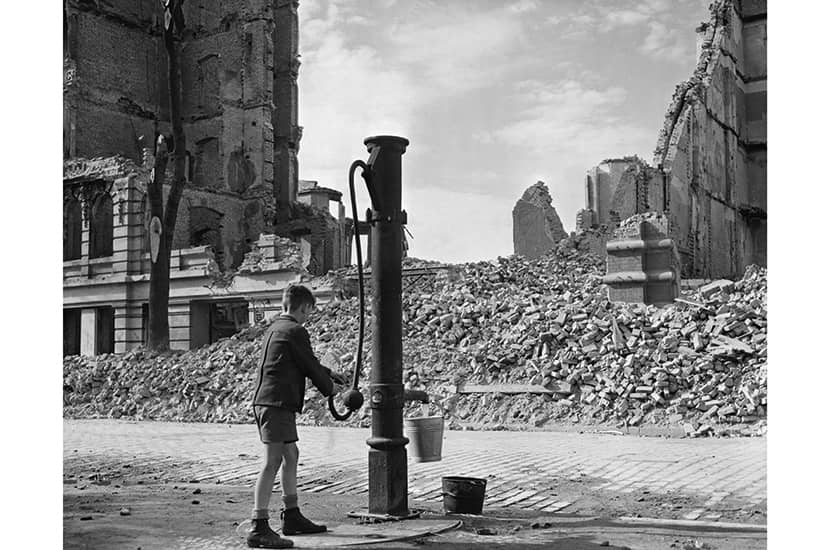In Geoffrey Household’s adrenalin-quickening 1939 thriller Rogue Male, a lone English adventurer takes a potshot at Hitler and then runs for cover. Few Germans were brave or reckless enough to resist the Führer. Once Hitler’s lunacy had become manifest, however, the dilemma for German patriots was painful: to love the Fatherland yet desire the downfall of Nazism. On 20 July 1944 a bomb went off in a briefcase at German GHQ in east Prussia but, extraordinarily, Hitler sustained only damaged eardrums and a pair of scorched trousers. The conspirators were hanged from meat hooks and, as a final gratuitous cruelty, their widows were sent bills for ‘execution costs’.
The textbook version of the anti-Nazi resistance leans heavily on the legacy of Claus von Stauffenberg, the Wehrmacht officer behind the July Plot. In many ways, von Stauffenberg was Hitler’s Aryan ideal: he had heels that clicked to command and wore a steel helmet even to his own wedding. Though a Berlin street was named after him in 1955, it was not until the mid-1960s that the Berlin Senate put up a memorial to him. By that time, almost any resistance to the German state could be justified in terms of atonement for Nazi crimes. If the Baader-Meinhof were able to count on sympathy among the young it was because they dared to do what most Germans had failed to do three decades earlier when it mattered: stand up to authority.
In May 1945 the ‘rubble women’ set to work, clearing bomb damage by passing buckets of debris down a line
Volker Ullrich, the eminent German historian and former literary editor of Hamburg’s Die Zeit newspaper, has done much in recent years to explain the Hitlerian enormities to an interested reading public. His two-volume life of Hitler was a bestseller in Germany. Eight Days in May, its sequel, chronicles the final week of the Third Reich’s existence after the Führer killed himself in Berlin on 30 April 1945. The war, as Ullrich demonstrates, did not end in the bunker after Hitler bit down on the cyanide capsule. In future Soviet territories, one totalitarianism was substituted for another — Hitler’s for Stalin’s. (Only when the Berlin Wall came down in 1989 did the second world war ‘end’ for countries behind the Iron Curtain.)
Hitler’s suicide propelled Germany into a state of gross darkness and disarray. Goebbels, the Nazi propaganda supremo, hoped that Germany might pursue a peace agreement with the USSR (despite German fears of Soviet retribution in the form of rape and looting). Hitler’s anointed successor, Admiral Dönitz, nevertheless refused to surrender to the ‘barbarous Asiatic horde’ from Russia. National Socialism, with its pseudo-Wagnerian cult of self-destruction and self-sacrifice, might have been designed for adolescence, but it was too late for the fanatical Dönitz. Germany’s unconditional surrender on 7-8 May 1945 left the 1,000-year Reich a moral and material ruin. (Dönitz governed without authority for another two weeks, and would die of a heart attack in 1980 at the age of 83.)
In vivid, fast-paced prose, Ullrich describes the strange silence that settled over the desolated German cities. The Trümmerfrauen — ‘rubble women’ — set to work, clearing bomb damage by passing buckets of debris down a line. Most Germans seemed to blame everything on Hitler. They felt no responsibility for the catastrophe but, dreadfully, began to feel the pinch of hunger. The agricultural bounty of the Hitler period was contrasted with the perceived failure of the triumphant Allies to feed the civilians in their care. In the Displaced Persons camps in the British zones of Germany, Balts, Poles and Ukrainians were riven by pain and foreboding. Allied aid workers listened sympathetically to their tales of loss and exile, but the local Germans often conspired to thwart the new alliances founded on K-rations and chocolate. And so the war continued wretchedly into peacetime. Superbly researched, Eight Days in May communicates the pity of Hitler’s war and its aftermath with sympathy and an impressive narrative verve.
Christopher Clark, whose celebrated first world war history The Sleepwalkers caused a stir in Germany on its publication in 2013, admires German historians like Ullrich for their stringent ‘self-scrutiny’ and attempts to come to terms with the Hitler past. Ullrich had, however, led the charge against The Sleepwalkers, which he thought exonerated Germany from co-responsibility in the outbreak of the 1914-18 war. (Clark reckoned that German guilt for the Nazi era had fatally obfuscated the argument.)
In Prisoners of Time, Clark brings his characteristic critical acumen to matters of German national guilt and German history. This collection of 13 essays, reviews and lectures considers, among other things, Christian-Jewish relations in 19th–century Germany, Prussian militarism, Kaiser Wilhelm II’s mental health and Himmler’s peculiar homophobia. The pieces have mostly been published elsewhere, and just occasionally the prose falters (‘Rather than cutting the salami of non-compliance into ever thinner taxonomical slices…’). Overall, though, this is a splendid, trenchant collection. Clark, Regius Professor of history at Cambridge, is not afraid to confront the darkest of dark histories.






Comments